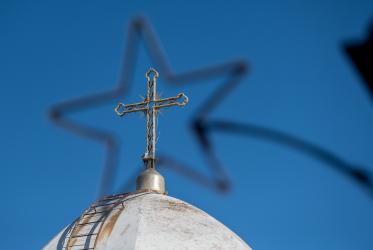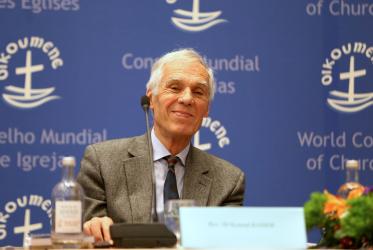by the Rev. Dr Konrad Raiser
General secretary of the World Council of Churches
The celebrations of the birth of Jesus of Nazareth which Christian churches around the world are preparing this year are inevitably marked by the approach of the end of a century and the dawn of a new millennium. Bethlehem will be the scene of a major commemoration of the passing of two thousand years since Jesus' birth, televised throughout the world. Countless Christmas pilgrims are expected in Nazareth, Jerusalem and many other places linked to the life of Jesus. But this will be a special Christmas everywhere. Even people who do not belong to any church will be drawn to the light which is shining forth from the one Christians confess as the Son of God who has entered human history.
Because the turn of a century and of a millennium has such strong symbolic power, noisy and glittering public festivities around this milestone will in many places overshadow the remembrance of the nativity of Jesus Christ. Yet despite the festivities, many will be entering the new millennium with anxiety and fear of the unknown. Similar forebodings filled many people at the time when Jesus was born. Remarkably, even after two thousand years, the life and message of this son of the Jewish people continues to attract men and women who find in him the source of hope and certainty for their lives. And as human history has continued, with all its glories and its shame, his announcement of the coming of God's reign has enabled people to face the future with confidence, while posing a critical challenge to all forms of human power.
But any truthful and honest commemoration of the birth of Jesus by the Christian churches ... the communities of those who have committed themselves to follow the way of Jesus ... must be accompanied by an attitude of repentance. For while Christians have carried his message, the gospel, to the ends of the earth, they have in their own lives been tempted often to follow other ways. The millennium which is drawing to a close has been a period of Christian division, strife and mutual condemnation. The desire to spread or defend a Christian culture and civilization has spawned violence and war, injustice and oppression. And the century now ending, which saw the emergence of the ecumenical movement and the growth of a sense of communion among the followers of Jesus Christ, has nevertheless been the most violent period in human history. We cannot commemorate his birth in Bethlehem without being mindful of the Shoah which will forever remain engraved in the memory of the people from whom Jesus came.
In the spirit of Jesus of Nazareth our message at Christmas this year should be one of reconciliation: reconciliation between Christians, Jews and Muslims in Israel and Palestine at a time when the peace process is entering its final stage; reconciliation between Christians and Muslims in Indonesia, Nigeria, Pakistan, Bosnia and Kosovo; reconciliation between Christians, Muslims and Hindus in India; and reconciliation among the members of the Christian family all over the world.
Significant steps have been taken during the last years of this century towards overcoming the sources of Christian division. These steps must continue. Entrusted with a ministry of reconciliation, the churches must begin in their own household. Only then will they be able to carry forward the light they have received in Jesus Christ. For what has come into being in him was life, and the life was the light of all people. The light shines in the darkness, and the darkness did not overcome it" (John 1:3-5). May this light shine forth as we celebrate Christmas this year.



